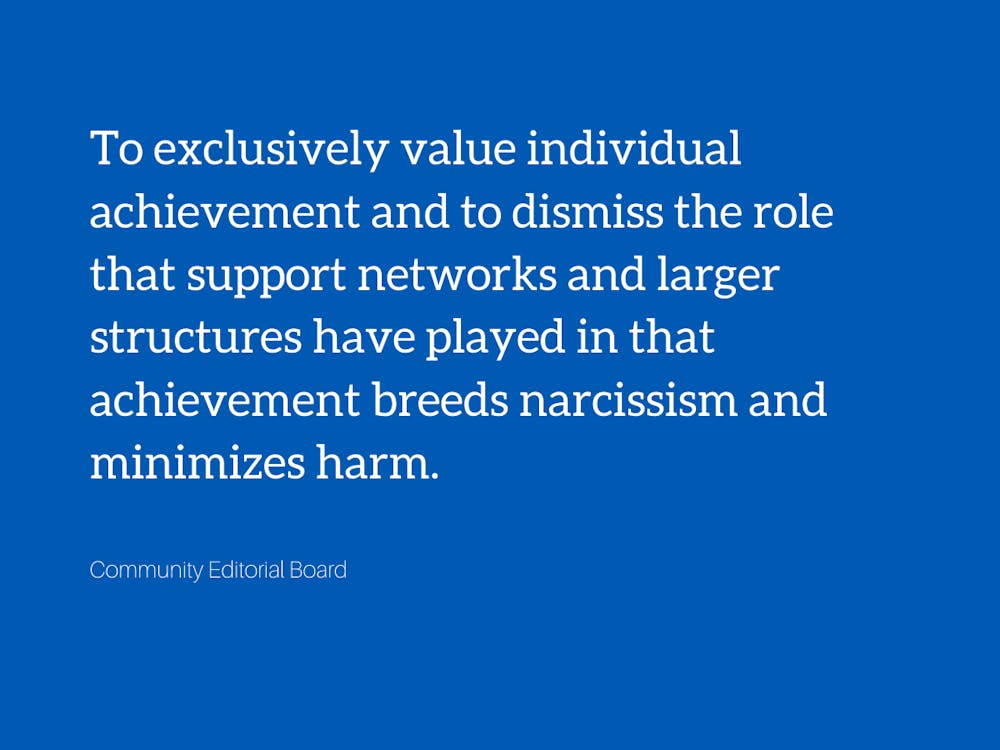This week, in the short lull between the end of the Young Trustee campaign season and the beginning of the DSG races, we’re presented with an opportunity to reflect on the work that has been accomplished in the political arena and to consider the challenges that the University and its students, faculty and staff, continue to face in the coming year. However, the chance of healthy reflection seems to be constantly overshadowed by inevitable fights over whose individual triumphs have had the greatest impact.
Candidates for Young Trustee or DSG President fill their campaign websites with examples of their leadership, the policy changes that they’ve pushed on campus and their unique knowledge of the trials and tribulations that Duke students, staff and faculty face. Rarely if ever do candidates seem to eschew this individualistic approach and emphasize instead coalition-building, collaboration, community. This year alone, two of the Young Trustee candidates had corrections made to their Chronicle profiles directly related to the characterization of work that they had done on and off campus. Duke teaches us that we should all be “leaders” without providing context for what communities we must be accountable to. This sentiment was reflected by a series of notable non-endorsements from student groups such as Diya, the Asian Students Association, and Mi Gente. Diya and ASA released a joint statement explaining their lack of endorsement of a Young Trustee candidate, saying “instead of highlighting their personal achievements to seek endorsements, candidates should instead be empowered to focus on uplifting student voices.”
The push towards a recognition of individual achievement may be natural in campaigns but it is in direct conflict with many of our purported values as a university. Duke’s “collaborative spirit” is incorporated into its branding well before students enroll. Campus tours emphasize the role of the housing system in maintaining a sense of community over the course of students’ four years. They describe the academic and social environment as being conducive to strong collaboration and idea-sharing. High school seniors choose to apply to and enroll at Duke because of the very same. This sentiment permeates Duke’s sports culture as well. The support of Duke’s (male) athletic teams is pitched as a rallying point for students of all academic disciplines and identity groups.
However, despite all the effort put into building an image of collaboration, the push for individual achievement is ingrained into us early in our time at Duke. For the Class of 2020, Convocation included Christoph Guttentag, Dean of Undergraduate Admissions, recounting the sometimes absurdly outstanding achievements of individuals in the incoming class: Student Ambassador to the Japanese Government, member of the Ghanaian House of Chiefs, internationally competitive hula dancer, etc. While the speech’s purpose was ostensibly to emphasize the new shared identity of the incoming class, the simultaneous emphasis on the individual betrays the University’s unwillingness to commit fully to an ethos of community and shared accomplishment.
This isn’t a Duke specific mentality of course, and nor is it entirely the fault of administrators or students working within a system that bestows prestige only in very specific ways. One need look no further than the scramble over nationally competitive scholarships that consistently reward only those with existing accolades, or even the US News and World Report Rankings that privilege the income of alumni and donation rates. It isn’t just coincidence that the collective reminiscing of our communal “Duke experience” is facilitated by the Senior Giving Challenge, a committee dedicated to making sure that Duke’s senior donation rate remains high.
Still, these are not systems that we have to participate in. Reed College, among others, has actively protested the flawed rankings methodology of US News and World Report. The statements from Mi Gente, Diya, and ASA similarly choose abstention over involvement in a process that fails to represent their values or validate their work.
More insidiously, Annie Yang’s column “'Effortless perfection' and neoliberalism at Duke,” details the ways in which this push for individual action reflects a larger, neoliberal understanding of worthiness present throughout higher education. This narcissistic mindset not only attributes a person’s value to their salary or the prestige of their post-grad plans, but actively allows for personal success at the expense of others’ wellbeing. None of this is to say that ambition should be penalized, but rather that to exclusively value individual achievement and to dismiss the role that support networks and larger structures have played in that achievement breeds narcissism and minimizes harm. When we don’t check these impulses, we promote behavior that “trivializes the efforts” of groups that actively work to make this campus better and undermines the coalition-building that goes into this work. We also endorse the blind ambition which leads students to work for corporations like McKinsey or Amazon or Palantir even while knowing the atrocities that they commit.
Breaking this mindset is not an easy task. It requires both monitoring your own actions as well as those of the people around you. At a personal level, take care of your friends and take some time to be grateful and reflect especially if you find yourself reaching for prestige, for positions of power how you might do so in a way that is not at the expense of all those that have supported you. As a campus community, let’s commit to a form of collective accountability that checks ambition for ambition’s sake and prioritizes the work of groups, even—or especially—when it occurs quietly.
Get The Chronicle straight to your inbox
Signup for our weekly newsletter. Cancel at any time.

